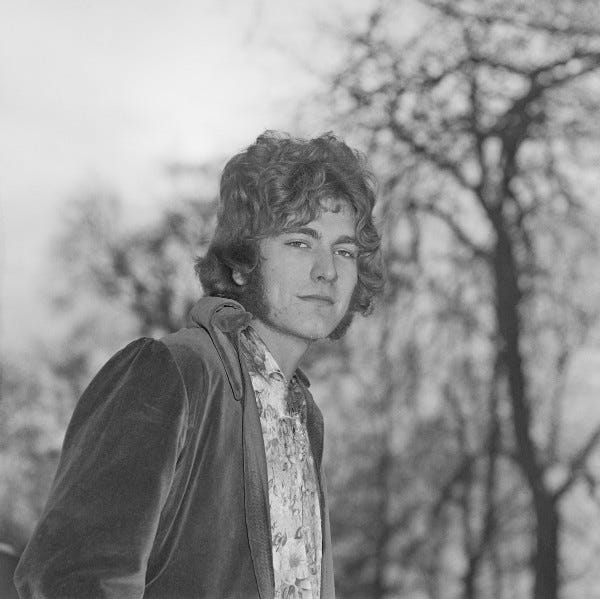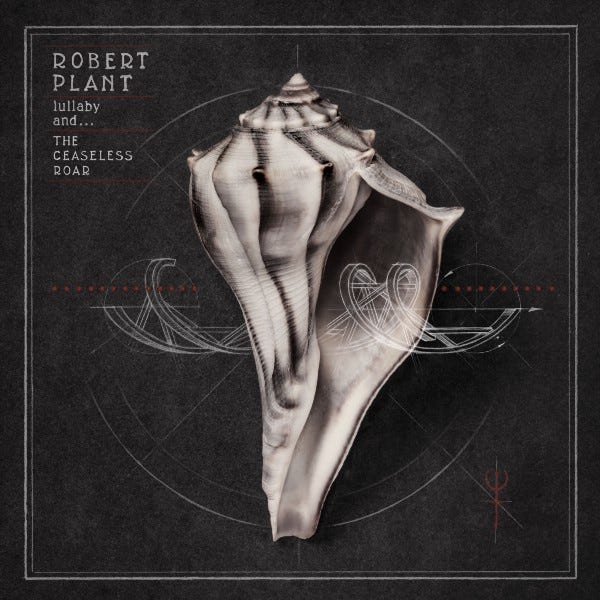
The act of remembering as path to enlightenment

They say the nostalgia gene kicks into high gear when you reach a certain age. You spend more time looking back, assessing mistakes and collateral damage, bridges burned and paths not taken. It’s perhaps inevitable that veteran tunesmiths dwell on these thoughts, but outside of a very small circle — Bob Dylan, Neil Young, Leonard Cohen, Bruce Springsteen maybe — we've learned to not expect too much from their efforts. The grand memory-lane excursion can quickly wind up in a cul-de-sac; there are limits to those kinds of narratives. They only move in certain directions.
So here comes Robert Plant — ageless as the voice of Led Zeppelin, but in real life a 66-year-old man who in the last decade has carved a unique path through the treacherous swamps of the post-megastardom career. One bold stroke was to turn down the ceaseless offers (and the corresponding piles of cash) to do an entirely predictable classic rock Led Zep Revisited pony show. Another was to seek out new musical horizons to explore, and with help from Allison Krauss, he found room for his voice inside the woeful songs of Appalachia, then wrote even more woeful songs in the same vicinity. Another was to tour with a band (The Sensational Shape Shifters) that’s versed not just in the blues but also its African antecedents. These guys gave Plant some kick, some African swing, some attitude.
Add that up, and Plant stands as a role model for the Encore Career done right. He continues to grow as a musician and singer; the new work, a collaboration with the aforementioned Shape Shifters, is notable for its rhythmic and stylistic variety. But what makes it most striking is something foundational, something that sets his enterprise apart from that of everyone in his peer group: He’s figured out that it’s pointless to attempt to re-create anything even peripherally associated with classic rock. He operates from the knowledge that if he’s fully engaged in the present as a musician, he can go anywhere as a lyricist. Sure, he’s right in the middle of the glory-days demographic, and his new songs glance at, and sometimes obsess over, events in the rearview. But they don’t sound like old arena retreads.
In fact, they don’t sound like anything else on offer right now. And that makes all the difference. Plant appears in these songs as a weary seeker, and among the things he seeks is passage back to a time when he had a more complete understanding of the emotional chessboard. Using the act of remembering as a path to enlightenment, he chases fleeting moments of clarity and recalls the times when a beautiful woman’s eyes crashed his circuits. “When I think about it now,”► he sings with detached Roy Orbison-style wistfulness on the set’s most pop-leaning track, “House Of Love.”

It’s impossible for Plant to escape nostalgia — rock people have so many of their own memories forever tied to his voice
As vividly rendered as the memory is, Plant’s focus is not just on the memory itself — he wants what the memory can teach him. In the present. This is one reason to pay attention to (if not give thanks for) Robert Plant’s latest, a collaboration with the six-piece Sensational Shape-Shifters. Here we find someone who’s usually tagged as an “icon” or “legend” deep in a new trench, burrowing for truth, suggesting that it’s possible to remain engaged in the world at a time of life when the nostalgia play is an entirely reasonable option. When Plant said no to Zeppelin redux, he was essentially committing to a more dynamic worklife — to continued exploration, the pursuit of music in different lanes. This shouldn’t be a radical notion, but think about it: How many of his peers dare to forsake the easy rituals of the arena-rock re-enactment game? Of those, how many are creating new work that has a spark of genuine newness in it? And lovelorn anguish and romantic yearning, too?
The reflective, poignantly melodic lullaby has those qualities, in surprising abundance. Plant seems to know that it’s impossible for him to escape nostalgia — for one thing, rock people have so many of their own memories forever tied to his voice. His current music makes peace with that, and occasionally has fun with that: On the wry “Turn It Up,” he roars like the predatory caged animal known to those who’ve heard Led Zeppelin II to deliver the punchline: “I’m stuck inside this radio, turn it up and let me out.”►

Plant’s 10th solo album works all the angles of memory
That’s a clue to Plant’s approach on this, his 10th solo album: He’s working all the angles of memory. Not simply as narrative device, but as a kind of metaphysical aid, helping guide one’s steps in the present. Even when he reaches back to the Zep playbook, with the steady blues cadences of “Little Maggie” and a few others, he’s not peddling an imitation of something he used to do. There’s a gruffness to the sound, and an old-man wisdom at work. The restlessness in his voice conveys something that wasn’t so evident back in those days — the sense of epic, endless seeking without necessarily finding. Don’t treat memory as an escape, he seems to say. Instead, learn from where you came from. Use the past to inform and expand your work, your awareness.
Of course this is exactly what Plant and Jimmy Page did in the early days of Zeppelin, seeking sultry detouring pathways along routes first traveled by Delta bluesmen. The idea wasn’t to port listeners back to earlier times, but rather to build something new out of the ancient-sounding codes and cadences. That unleashed unexpected creative torrents — blues as carnal religion, spirit guide and metaphysical gathering point — and suggested that even a “radical” movement like rock could be seen as part of an extended evolutionary continuum. Plant’s solo career is notable for similar moves, from the ersatz jump of the Honeydrippers to the collaborations with Alison Krauss, which distilled the lamenting tones of Appalachia into music of compelling contemporary vitality.

Plant activates enough of the soundprint of Led Zeppelin to enchant oldheads, but never dwells there long enough to be accused of rehashing
Thing is, it seems a rock star only gets access to that vitality if he or she is committed to creativity in the present. Plant manages a rare trick on this record: He activates just enough of the soundprint of Led Zeppelin to enchant oldheads, but never dwells there long enough to be accused of rehashing. He’s got massive drone sounds that oscillate like waves off hot dance-festival pavement sitting right beside quiet, understated, confiding vocal phrases — often it seems Plant is looking for a commonality of tone, and intent, between the far-flung stylistic realms that have occupied him at various times. Inside the swirls of sound, it’s possible to detect lonesome Tennessee fiddle alongside power-chord electric guitar, drones like somber Gnawa chants crossed with lilting Celtic melodies, bits of blues cliche reframed by violin and animated by deftly syncopated West African grooves.
Listen into the interior of these arrays, and you can hear Plant weaving from foreground to background, offering heavy breaths and slight squibs of sighs, sometimes using his still-gilded voice as another instrumental texture to create plateaus of long-tone brooding. Sometimes, he just holds one note for a while, until Gambian musician Juldeh Camera arrives with his one-string violin-like ritti, joining the voice and bolstering the sound. The results are downright magical — a single, keening, unbroken ribbon of tone with no start or end point, stretching beyond genre, reaching forward and backward in time to suggest music of prehistory and music of tomorrow. No beginning, no end. With these songs, Plant and his crew have created something truly rare, a graceful and deeply profound commonality of sound that depends less on language than feeling. Every culture calls “love” by a specific name, but the root of it, the emotional core, is universal. Listening to lullaby, you get the sense that it’s also eternal.
Follow Tom Moon on Twitter @moonjawn.
Don’t miss a beat! Follow Cuepoint:
Twitter | Facebook | mailing list | main page



